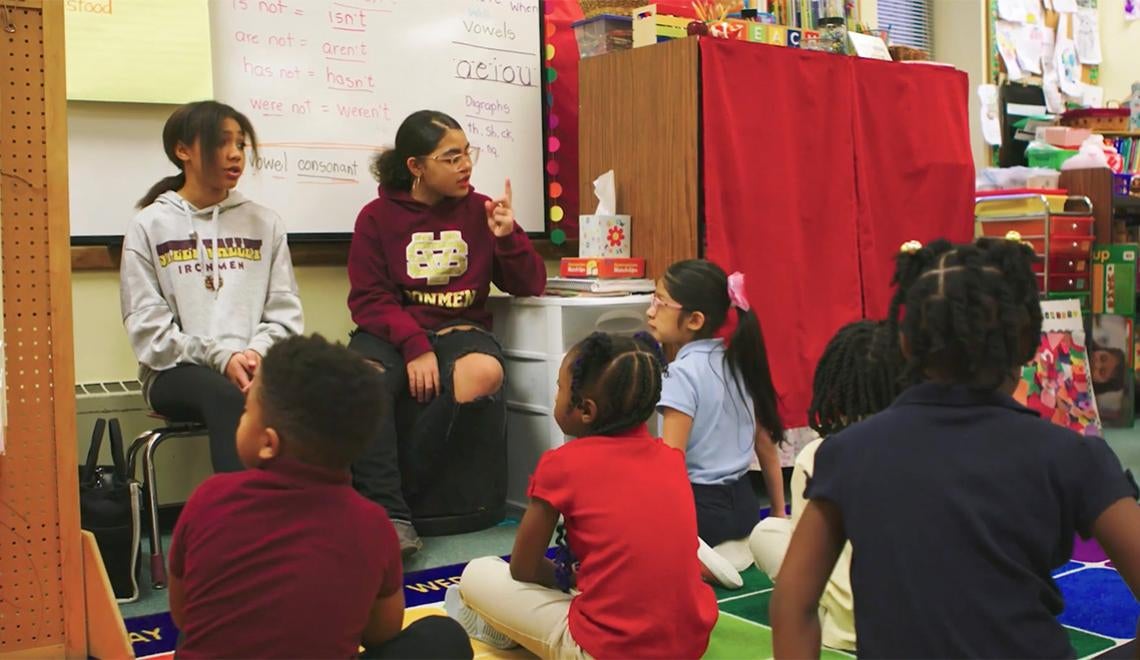
Subscribe to Pittwire Today
Get the most interesting and important stories from the University of Pittsburgh.The Pittsburgh Study (TPS) is much more than a run-of-the-mill longitudinal study. It is a program co-developed by scientists and parents, teachers and students, to follow 8,000 young people in the region from birth to adulthood to better understand what children need to thrive.
In recognition of this work, the University of Pittsburgh and TPS have won the W. K. Kellogg Foundation Community Engagement Award.
Administered by the Association of Public and Land Grant Universities, the award is given annually to four public universities in recognition of “exemplary strides” made toward close and productive community engagement. One of the four award winners will go on to win the C. Peter Magrath Community Engagement Scholarship Award, the nation’s premier recognition for community engaged scholarship.
The association lauded TPS specifically for its work with regional communities to advance equitable access to health care and ensure communities have the data, tools and support they need to ensure children and adolescents thrive.
“We are working diligently to shift our own paradigm of sharing power through curating vulnerable dialogue spaces where we may all see each other’s humanity, so we may truly conduct research with communities instead of on communities,” said Felicia Savage Friedman (CGS ’01, EDUC ’07), co-director of TPS, course director for Pitt’s Antiracism and Health Equity Solutions class in the med school, and founder and CEO of YogaRoots On Location.
“Local communities made this accomplishment possible. We’ve worked tremendously hard to build meaningful relationships throughout the 90-plus neighborhoods in the Pittsburgh region,” Friedman said.

The study comprises nine scientific committees that develop and test interventions at several stages of childhood development. Each committee is co-led by an academic researcher and a member of the community.
Take the Steel Valley School District, where TPS has implemented early literacy programs for kindergarteners; in middle school, the Just Discipline Program helps students, staff and teachers rethink approaches to discipline. For older students, interventions include programs centered on reducing violence, rigid gender norms, racism and discrimination.
[Read more about the Just Discipline project and its expansion]
Elizabeth Miller co-director of TPS, founded the study with Terence Dermody, the Vira I. Heinz Distinguished Professor and Chair of Pediatrics, in 2018. They started with $8 million in catalyst funding. That has grown to more than $25 million in extramural research funds, Miller said. TPS is supported by UPMC Children's Hospital Foundation, the Shear Family Foundation, PNC, the Grable Foundation and the Heinz Endowments.
“Money funds both research and advocacy,” said Miller, who is also division director of adolescent and young adult medicine, as well as professor of pediatrics, public health and clinical and translational science.
An upcoming project epitomizes the study’s ability to bring together community, science, data and advocacy in a way that would be unimaginable in a traditional public health study.
In the Youth Data Literacy Ambassador program, which is rooted in the work of the Western Pennsylvania Regional Data Center, Pitt student workers will help high school students explore data from the Healthy Allegheny Teen Survey — a health and wellness questionnaire in which the high schoolers had previously participated.
The high school students will discuss the data, ask questions and share their interpretations with school administrators, researchers and the larger community.
“This is a critical part of working with data — connecting with community members to bring their wisdom into the data analysis and interpretation,” said Liz Monk, director of community engagement and special projects at the Regional Data Center.
“The University of Pittsburgh embraces its role as a community engaged anchor institution,” said Lina Dostilio, vice chancellor of engagement and community affairs at Pitt. “We’re dedicated to solutions that can take root and build long-term community capacity.”
— Brandie Jefferson, photography by Tom Altany
A community-engaged anchor institution
The Anchor Initiatives are a suite of strategies developed to leverage the University’s role as an economic anchor to Southwestern Pennsylvania. An integral component to the Plan for Pitt, the Anchor Initiatives amplify Pitt’s regional impact in the areas of buying, building and hiring locally; community engagement and partnerships; placemaking; and workforce development. Learn more about Pitt’s Anchor Initiatives.


